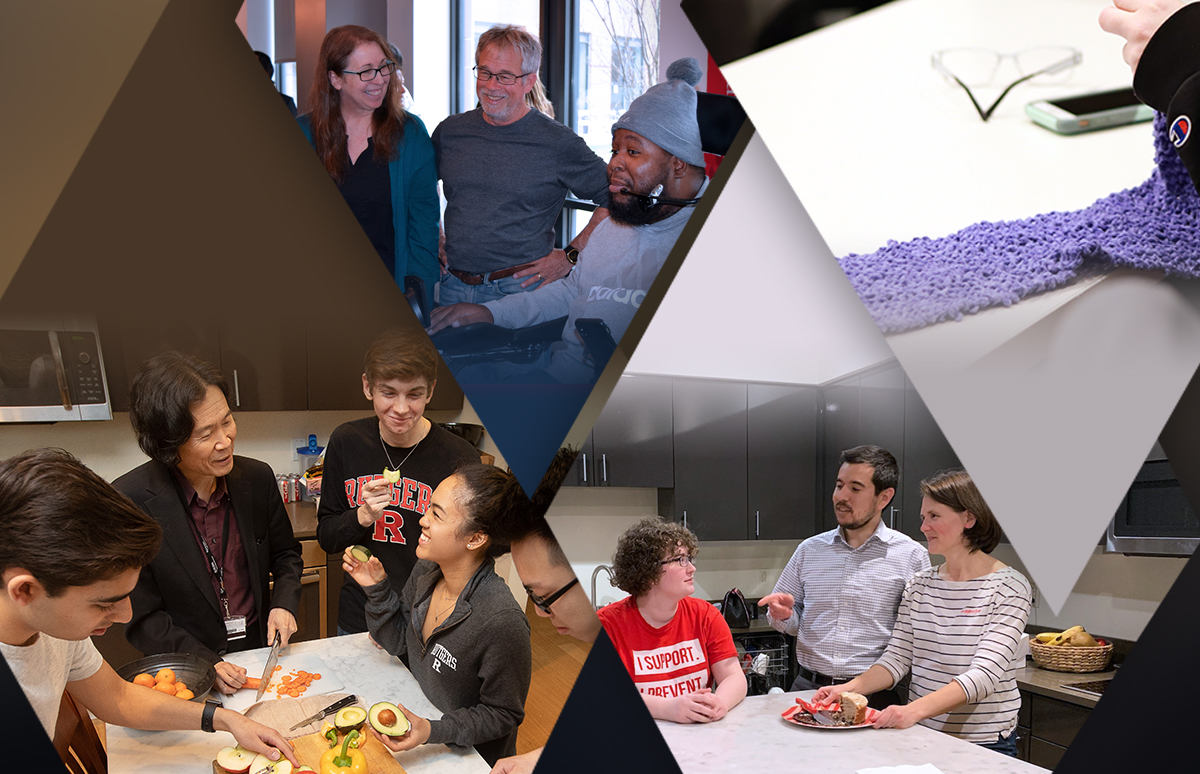The Faculty Fellows have been integral to the realization of the Honors College mission. Between the events they host, classes they teach, and everyday conversations they hold, the Faculty Fellows complete the living-learning community. Ultimately, they encourage students to learn new things and meet new people with the aim for everyone to get the most out of their experience at the Honors College.
From a distance, the Honors College may appear to solely be an academic environment. Upon a closer look, it is that and much more—a place that stretches the bounds of learning by putting diverse ideas and resources together, all under one roof. Here, there are new connections to be found at every turn. These connections have the potential to become friendships, primarily because of the neighborhood that is the Honors College. For first-year students, it may be daunting to engage in the range of activities at the Honors College and Rutgers at-large. For upperclassmen, it can be challenging to stay connected to the Honors College community. For both groups, the Honors College Faculty Fellows are here to help.
According to Dean Matsuda, Academic Dean and Professor-in-Residence, the initial aim of the Honors College community was to emulate a small liberal arts college within the larger research university. Part of that vision was to establish a framework in which faculty are not only teaching classes and mentoring, but also living near students and establishing cross-generational personal connections as a community. To accomplish this, Faculty Fellows became essential roles in the community, or “neighborhood” of the Honors College.
With an open mind to attend the events hosted by the Faculty Fellows, like Munchies with the Mazzeos, Cookies with Chayko, Craft Night with Dr. Hartman, and Open Kitchen Night with Dean Matsuda, connections and friendships are even more possible.
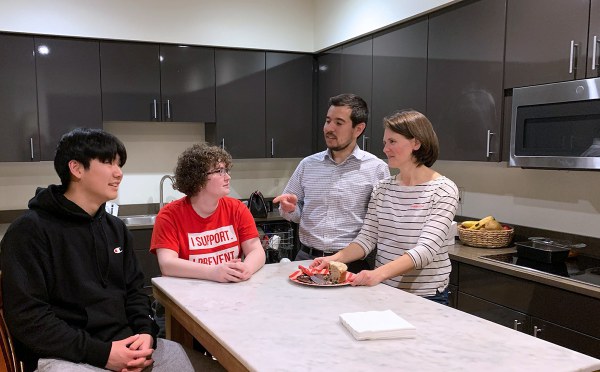 If you happen to pass by the Mazzeo family’s apartment at the HC on a Tuesday evening, you may smell freshly baked bread or hear light-hearted chatter. As Dr. Mazzeo said, “We view our roles as being part of our community, that’s our whole family,” which is entirely clear from the events Dr. Mazzeo, his wife Jonina, and their two daughters host. “We’ve been through undergraduate and graduate programs, and have experience interacting with people outside of academia as well. We have life experience that we’re happy to share in a non-threatening and non-condescending way,” he reflected.
If you happen to pass by the Mazzeo family’s apartment at the HC on a Tuesday evening, you may smell freshly baked bread or hear light-hearted chatter. As Dr. Mazzeo said, “We view our roles as being part of our community, that’s our whole family,” which is entirely clear from the events Dr. Mazzeo, his wife Jonina, and their two daughters host. “We’ve been through undergraduate and graduate programs, and have experience interacting with people outside of academia as well. We have life experience that we’re happy to share in a non-threatening and non-condescending way,” he reflected.
The Honors College Makerspace offers hands-on scientific and creative opportunities and is also a place where you might run into Dr. Mazzeo. He teaches a Byrne Seminar there about paper-based electronics and robotics. If you like music, they have performed what Dr. Mazzeo described as “random acts of music,” where Jonina played viola and piano, he played the violin, and a Mason Gross student stopped by. Another way to get to know the Mazzeos is by registering to attend one of the dinners they host, where you can meet other students, learn something new, and enjoy a meal. “I think it can be really easy as a first-year to feel adrift at such a big school, away from family and our hometowns…Something as simple as gathering over the unique cuisine of the night and chatting in [the Mazzeo] family apartment was a really special part of my first-year experience,” shared Claire Donahue (HC/DRC/RBS ‘22). As a family living in the Honors College, the Mazzeos can provide advice or the comfort of a group dinner to any students feeling homesick.
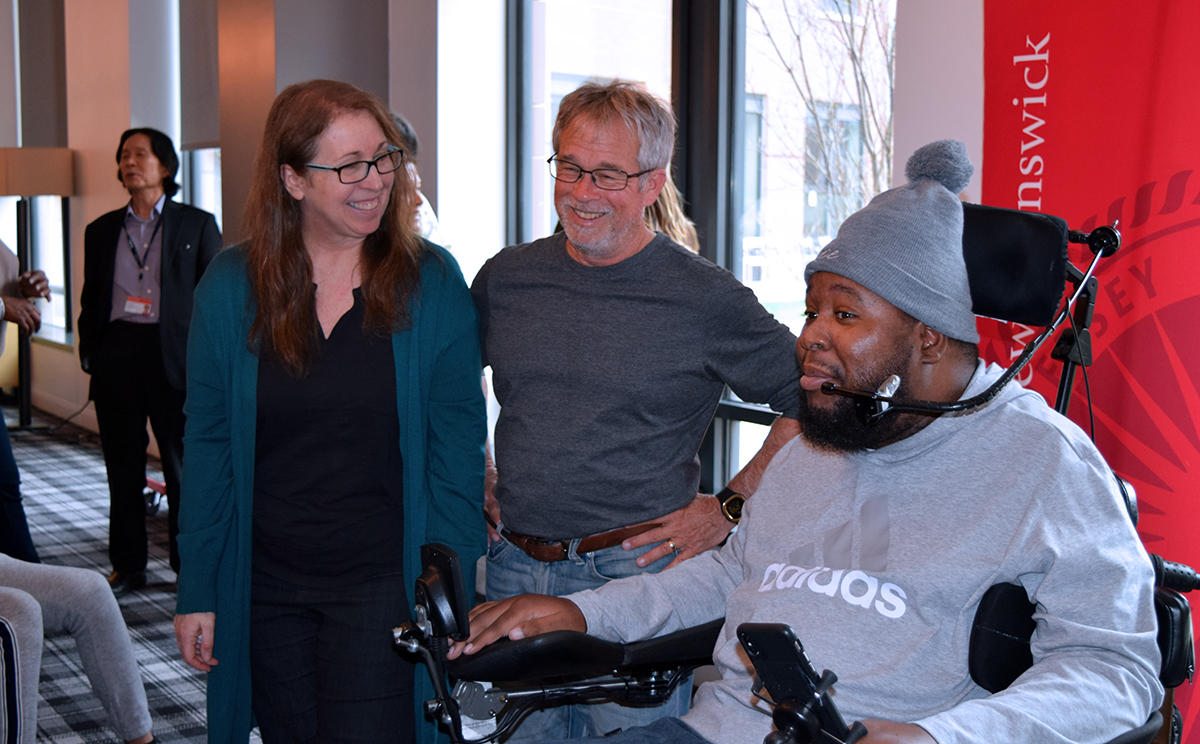
In her third year as a Faculty Fellow living on the second floor of the HC with her husband Glenn Crooks, Dr. Mary Chayko has found ways to involve both audiences of communications and Honors College students. She does this through topical discussions and even special guests, such as former Rutgers football star and philanthropist Eric LeGrand. Dr. Chayko is a sociologist and an interdisciplinary professor of communication and information at the School of Communication and Information (SC&I) and is the director of the Digital Communication, Information, and Media and Gender and Media minors at Rutgers. There are a wide range of topics you can approach Dr. Chayko about, from practical advice on social media platforms to discussion of the semester’s challenges to appreciation for Bruce Springsteen’s music. She shared that her weekly “Chili with Chayko" is very informal. "I open the door, put on some chili, and sometimes I have cookies or other treats. Just as long as students want to stop by, we can talk about anything.” For student Lily Chang ('22, HC/SAS/DRC), “Dr. Chayko’s event was very welcoming. I instantly felt like I could talk about not only school, but friends and family with her.”
Dr. Chayko values honors education, but argues that not all learning must take place in a classroom. “You can learn more when conditions are relaxed, and I try to set that tone with music and food," she said. "It's communal and enjoyable, and there are so many topics we can explore together.” Dr. Chayko encourages Honors College students to go to the monthly HC Coffeehouses (she has played the flute at them before!), participate in events at Rutgers, read the newsletter, follow the Honors College social media, and stay connected.
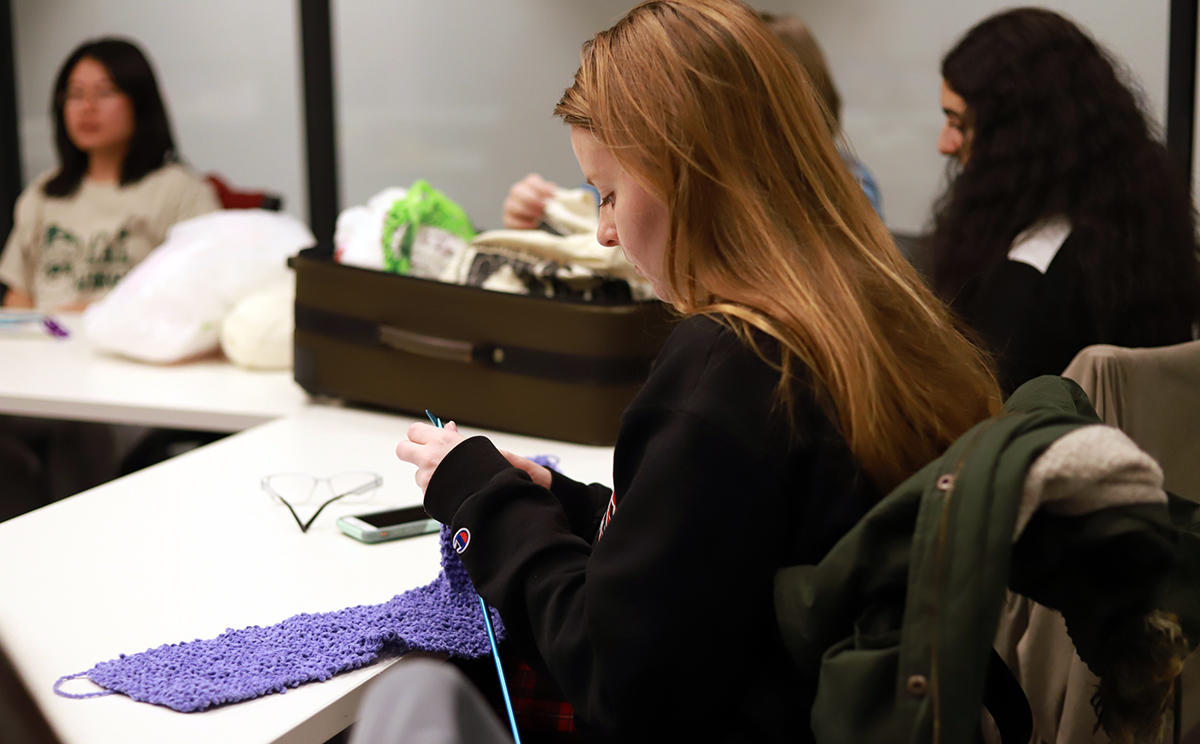
Dr. JeanMarie Hartman, though no longer a resident of the Honors College, remains a Faculty Fellow and connects with students at her weekly Craft Night in the HC East Lounge, where students can learn to knit or crochet and simultaneously earn HC service hours. Once a year, Dr. Hartman and the students donate boxes and bags full of scarves and hats they make to Elijah’s Promise. She expressed that “for anybody, doing service keeps you grounded in the community, it makes you pull out of the day-to-day rush of responsibilities and think about giving to somebody else and helping in a broader way.”
Student Charlie Anderson (HC/SAS ‘22) is a proud regular of Craft Night.“When I started college, I wanted to pick up a new hobby and meet some people. While I’ve accomplished both those things, Craft Night has had even more of a positive impact than I thought. Last semester, I saw how many scarves and hats just a few of us can make and I know how much that can help a person who benefits from Elijah’s Promise.”
Dr. Hartman originally started the Craft Night series to offer students an activity that is enjoyable and relaxing. “My observation is that students are too stressed. Doing something for somebody else that’s repetitive and right-brained is good for them in order to destress,” she explained. “Seeing what’s going on with the students and watching them progress from beginners to very talented crafters” is her favorite aspect of Craft Night. Something unusual you may find if you join the crafters on Wednesday evenings is “plarn,” what Dr. Hartman explains as yarn made out of strips of plastic bags. “Plarn” serves a dual purpose of diverting microplastic pollution from the oceans and using the plastic material to create things like mats and baskets. Her plan is to make mats for homeless people, as the plastic can be sturdy, provide cushioning, and withstand precipitation. Students can also take an Interdisciplinary Honors Seminar with Dr. Hartman, called “Tracing the Raritan River,” which she developed as a professor of landscape architecture at the School of Environmental and Biological Sciences for students of various interests to think about the same specific thing, the Raritan River basin.
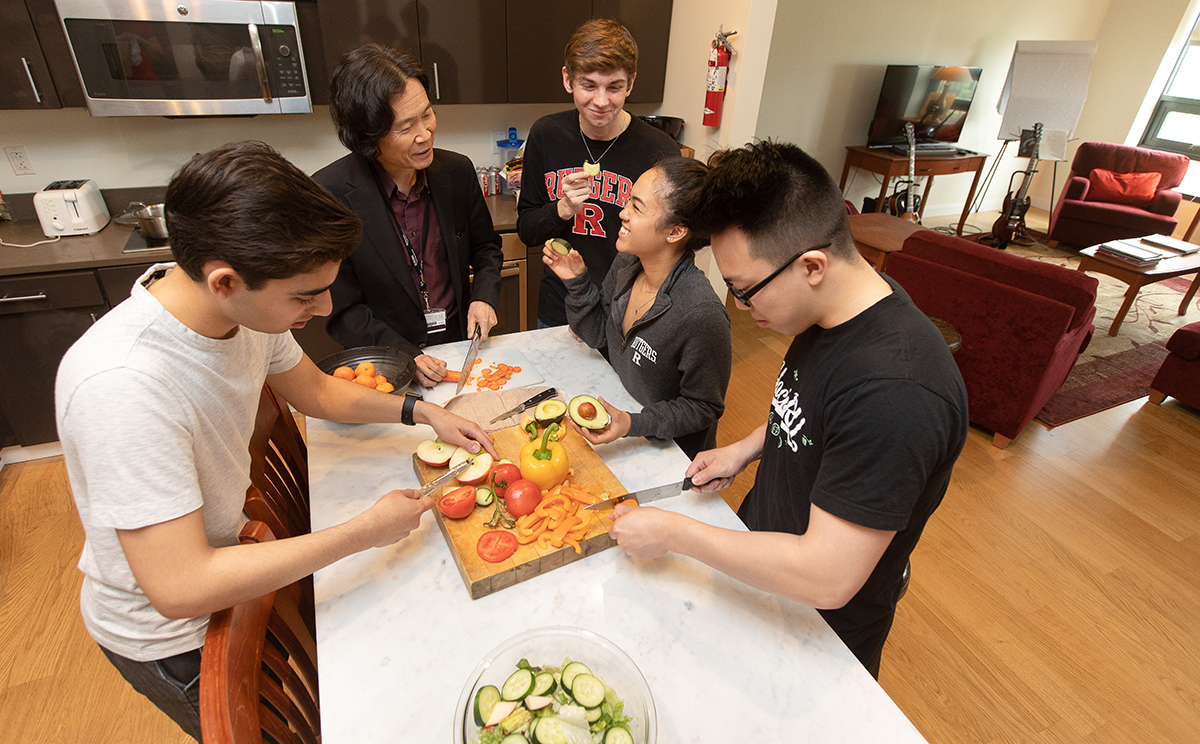
For Dean Matsuda’s Open Kitchen Nights, the decisions and creativity are left to the students. Dean Matsuda says these nights are most successful when students gather as a “big collective kitchen” and he can say “go ahead, it’s your kitchen.” He shared that one time, a few students expressed interest in organizing an all-afternoon barbecue and another student, hoping to exercise his gourmet cooking skills, organized a series of three fusion cuisine dinners with themes on cultural diversity.
Given the interdisciplinary nature of the Honors College, it is important for students to view the Faculty Fellows in that same light. They are dynamic people, with family and friends and passions for travel, music, art, and learning. Each of them with life experiences and wisdom to share and offer, and of course, food! You do not have to be a communications major to learn from Dr. Chayko or an engineering student to chat with Dr. Mazzeo. As a living-learning community, no one is defined by their major, field of work, or resume, but by their ideas, intentions, and friendships. Students are presented with a unique opportunity as members of the Honors College. They need only take the first step to make new connections with the HC Faculty Fellows and other students who come to their special gatherings.
